EXPANDING HORIZONS
Water Operators Partnerships (WOPs)
In the declaration for establishing India Water Operators Partnerships there was a firm recommendation on structure, objectives and action plan for the India Water Operator Partnerships. The Ministry of Drinking Water and Sanitation has formally recognized CEC as a National Key Resource Centre (KRC) for building capacities of the India Water Organizations across the Water Sectors and enabled CEC to function as a National Secretariat for the India Water Organization Partnerships.
Partnerships In Change Management
The CEC had the unique opportunity of working with the many States of the Country and Globally with the Governments of Maharashtra (Jeevan Prathikaran) and Jharkhand (PHED) State Water Departments, Governments of Himachal Pradesh and Tripura to initiate change interventions among their Engineers and other officials. CEC has also shared its experiences at the National level with UNICEF and GOI. The democratization of water management has found resonance in World Bank assisted TN Water Resources Management Project (TNRWS). Similarly, the States of Rajasthan, Orissa and Uttar Pradesh‘s Water departments have also used the expertise of CEC in the change management initiatives.
CEC also promotes international collaboration (South South Collaboration) with countries such as Kenya, Ethiopia, Afghanistan, Bangkok, Malawi, Madagascar, etc and World Bank Institutes.
Historic Events
CEC proudly announces the signing of the ‘FLL Core Partners Network Agreement ‘with our Learning Partner ‘Addis Ababa Water And Sanitation Authority(AAWSA) and with the Anchoring Agency for FLL Delivery Network, ‘GWP (Med), Athens, Greece on this day 14 th February 2025 .This marks as an historic event in FLL Journey spreading its Process across the Globe with the able support and guidance of the World Bank.
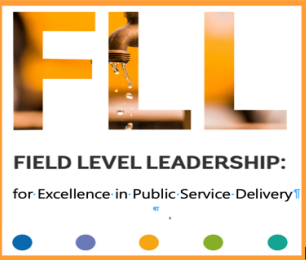
FLL Partnership Journey
Field-Level Leadership (FLL) is a values-driven change management approach with a growing record of being able to mobilize staff across the ranks of water agencies, translating their motivation into systemic and significant performance improvements at the organisational level. The FLL approach was developed in early 2000s by a group of public servants in the Government of Tamil Nadu in Southern India. The Chennai-based Centre of Excellence for Change (CEC), in collaboration with the World Bank, has further improved and systematized the FLL approach over the last 15 years, through numerous pilots implemented in World Bank-financed projects. These pilots have spanned 13 public utilities, agencies and departments in Asia and Africa. An FLL program comprises of a standardized set of interventions and techniques, implemented through South-South collaboration between public utilities, and covering peer-led safe-space workshops, support for emerging networks of change leaders across the organization, and individual and collective change initiatives. FLL initially engages staff across the entire organisation for a period of several months, and it is organically sustained thereafter by the emergent leadership that it creates
With many successful implementations and their impressive results, the demand for
FLL trainings has steadily grown around the world
In the mean time the World Bank had launched a “Webinar (Web-Ex Meeting)Presentation on Field Level leadership (FLL), an innovative approach that
improves development outcomes by creating large number of Change Leadersin the Ranks Public Agencies on 28.9.2020.
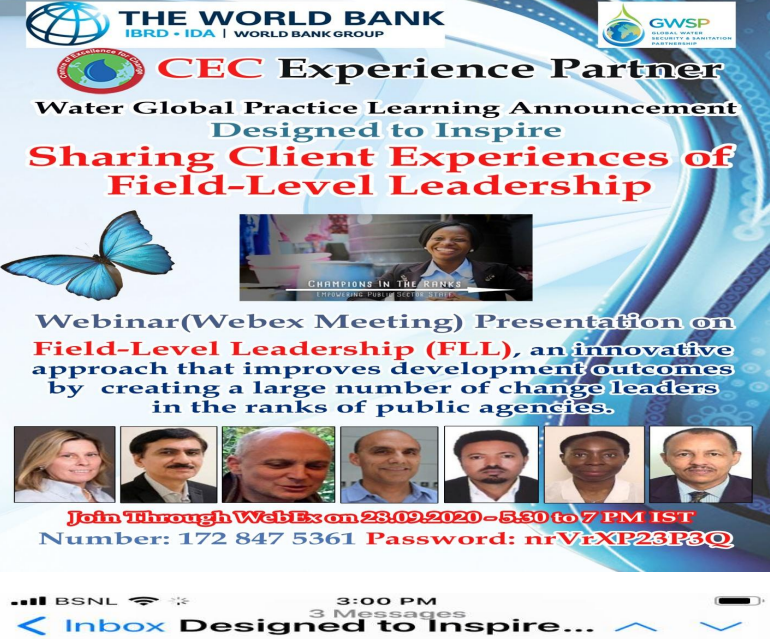
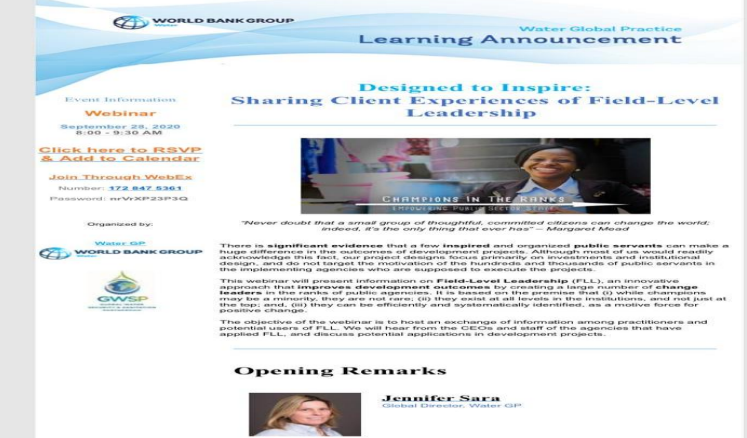
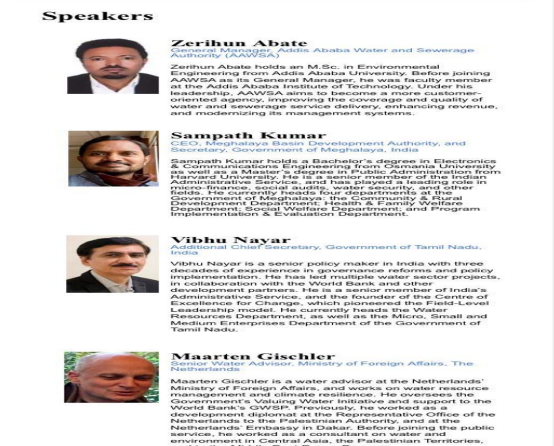
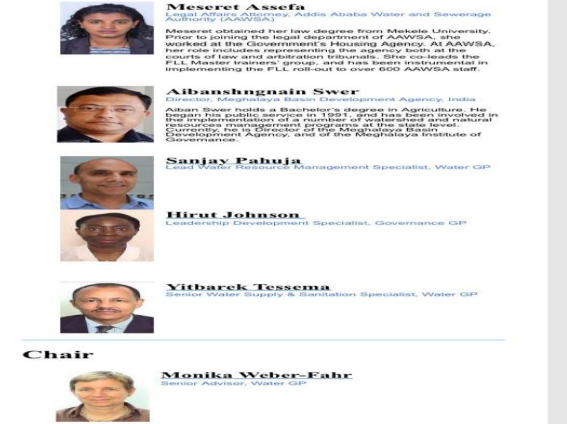
The outcome of the Webinar was overwhelming and this Web Ex Meet paved the way for expanding the horizons of FLL across the Globe In response to this growing demand, the World Bank has consulted with the key stakeholders on how to set up a self-sustaining network of public water institutions that can provide the needed FLL trainings and support at a global scale. Following a competitive selection process, the World Bank has now recruited the Global Water Partnership’s Mediterranean Office (GWP-Med) as the facilitator and anchor organisation for setting up the FLL global network. In this context and aligning with the related Terms of Reference for this assignment, GWP-Med is organising in Athens, Greece, a 2-day workshop (26-27 March 2024) with the Core Partners -the Centre of Excellence for Change (Chennai), the Addis Ababa Water and Sewerage Authority, and the World Bank, to discuss and agree on the instruments, modalities and way ahead towards the future FLL Delivery Network.
Provisional Agenda
In the process of exploration for scaling up of FLL, it has been decided to develop the capacity to deliver FLL support to 20-30 organizations per year considering the the potential demand for delivering FLL at this scale - and the demand could be further grown. Adequately responding to the growing demand would require setting up a systematic operation, including but not limited to coordinated business development, orderly planning and precise targeting, timely provision of training services, quality assurance interventions, and learning from experiences. Responding to growing demand would require the ability to deliver FLL workshops in multiple countries, cultural contexts and languages, with teams of about 5-10 trained facilitators deployed for 14 days per intervention, followed by backstopping support throughout the implementation process.This necessitated a partner (an “Anchor organization”) that could serve the above-mentioned functions and thus support CEC and the regional FLL training centre (like AAWSA) in scaling up FLL. The World Bank launched and concluded the procurement of “Anchor Organization” late last year. The Global Water Partnership - Mediterranean Team (GWPMed) Athens, Greece.was selected for this assignment. GWP-Med has global recognition and a solid reputation for successfully facilitating many multi-stakeholder processes involving water organizations. They have many decades of experience in the water sector, having operated thoughtfully and with diligence in multi-cultural environments. The first step, by the Anchor Organization was to organise a workshop that would allow all the Core Partners to jointly build a shared vision for the FLL Network of the future, agree on principles of working together, and begin to lay out some key business processes and perhaps even set out the scope for what could become a strategic plan.
Accordingly, the Field Level Leadership: Anchoring the Future FLL Delivery Network
Field Level Leadership: Anchoring the Future FLL Delivery Network First Core Partners’ Workshop 26 & 27 March 2024 Athens, Greece Note & Agenda
Field-Level Leadership (FLL) is a values-driven change management approach with a growing record of being able to mobilize staff across the ranks of water agencies, translating their motivation into systemic and significant performance improvements at the organisational level. The FLL approach was developed in early 2000s by a group of public servants in the Government of Tamil Nadu in Southern India. The Chennai-based Centre of Excellence for Change (CEC), in collaboration with the World Bank, has further improved and systematized the FLL approach over the last 15 years, through numerous pilots implemented in World Bank-financed projects. These pilots have spanned 13 public utilities, agencies and departments in Asia and Africa. An FLL program comprises of a standardized set of interventions and techniques, implemented through a South-South collaboration between public utilities, and covering peer-led safe-space workshops, support for emerging networks of change leaders across the organization, and individual and collective change initiatives. FLL initially engages staff across the entire organisation for a period of several months, and it is organically sustained thereafter by the emergent leadership that it creates. With many successful implementations and their impressive results, the demand for FLL trainings has steadily grown around the world. In response to this growing demand, the World Bank has consulted with the key stakeholders on how to set up a self-sustaining network of public water institutions that can provide the needed FLL trainings and support at a global scale. Following a competitive selection process, the World Bank has now recruited the Global Water Partnership‟s Mediterranean Office (GWP-Med) as the facilitator and anchor organisation for setting up the FLL global network. In this context and aligning with the related Terms of Reference for this assignment, GWPMed is organising in Athens, Greece, a 2-day workshop (26-27 March 2024) with the Core Partners -the Centre of Excellence for Change (Chennai), the Addis Ababa Water and Sewerage Authority, and the World Bank, to discuss and agree on the instruments, modalities and way ahead towards the future FLL Delivery Network.
Field Level Leadership: Anchoring the Future FLL Delivery Network
First Core Partners’ Workshop
26 & 27 March 2024
Athens, Greece
Note & Agenda
Field-Level Leadership (FLL) is a values-driven change management approach with a growing record of being able to mobilize staff across the ranks of water agencies, translating their motivation into systemic and significant performance improvements at the organisational level. The FLL approach was developed in early 2000s by a group of public servants in the Government of Tamil Nadu in Southern India. The Chennai-based Centre of Excellence for Change (CEC), in collaboration with the World Bank, has further improved and systematized the FLL approach over the last 15 years, through numerous pilots implemented in World Bank-financed projects. These pilots have spanned 13 public utilities, agencies and departments in Asia and Africa. An FLL program comprises of a standardized set of interventions and techniques, implemented through a South-South collaboration between public utilities, and covering peer-led safe-space workshops, support for emerging networks of change leaders across the organization, and individual and collective change initiatives. FLL initially engages staff across the entire organisation for a period of several months, and it is organically sustained thereafter by the emergent leadership that it creates.
With many successful implementations and their impressive results, the demand for FLL trainings has steadily grown around the world. In response to this growing demand, the World Bank has consulted with the key stakeholders on how to set up a self-sustaining network of public water institutions that can provide the needed FLL trainings and support at a global scale. Following a competitive selection process, the World Bank has now recruited the Global Water Partnership’s Mediterranean Office (GWP-Med) as the facilitator and anchor organisation for setting up the FLL global network.
In this context and aligning with the related Terms of Reference for this assignment, GWP-Med is organising in Athens, Greece, a 2-day workshop (26-27 March 2024) with the Core Partners -the Centre of Excellence for Change (Chennai), the Addis Ababa Water and Sewerage Authority, and the World Bank, to discuss and agree on the instruments, modalities and way ahead towards the future FLL Delivery Network.
Provisional Agenda
Day 1, 26 March 2024
09:00-10:30
Session 1Welcoming, introduction and team connection
Facilitator: CEC & AAWSA
Exercises for introduction and connection, building on the FLL experience
09:00-10:30
Session 1Welcoming, introduction and team connection
Facilitator: CEC & AAWSA
Exercises for introduction and connection, building on the FLL experience
10:30-11:00
Coffee break
11:30-13:00
Session 2The FLL journey –looking back and looking forward
Facilitator:Anthi
Purpose: Have clear and common understanding on (i) the FLL and (ii) the tasks ahead
Reflecting on the FLL experience – group work (45min)
- What we had hoped
- What happened
- The challenges faced and the responses
- What we learnt
- What needs to be different in the future
The tasks ahead rooted in the experience of the past (45min)
- What is the current assignment about?
- Reflecting on the tasks ahead – hopes the hindrances – Group work
13:00-14:00
Lunch
14:00-15:30
Session 3 Our Vision for the FLL Delivery Network: Let’s build it together
Facilitator:Vangelis
Purpose: Co-develop (i) the draft vision and (ii) the key principles for collaboration
Co-developing a vision for the FLL Delivery Network
- Some food for thought for preparing a vision statement
- Co-drafting a vision statement for the FLL Network – group work
Setting the basis for working together
- What are the stages of working together? Where do we want to be?
- Co-prepare a list of shared values and principles for working together – group work
- How to operate in partnerships?
15:30-16:00
Coffee break
16:00-17:30
Session 4The FLL Delivery Network: Creating Value together – who, what, where, how?
Facilitator: Monika
Purpose: Have clear and common understanding on the context of business processes and co-develop the key ones for the FLL Delivery Network
- What is the notion/concept of ‘core business process’? Some examples.
- Why does it matter? What’s the value?
- Co-design exercise on FLL Delivery Network’s key business processes
17:30-18:00
Reflections on the Day
Facilitator: Monika
- What worked and what is (still) missing
- “Parking lot” – things that came up and that we said we’d address later
- Moment of Appreciation
19:00
Dinner together
Based on the discussion of the day, World Bank and GWP-Med will draft a “Zero Draft of an Operating Agreement”
Day 2, 27 March 2024
09:00-09:30
Recap and group exercise
CEC and/or AAWSA to propose
09:00-10:30
Session 5Resolving the unresolved&the pathway ahead
Facilitator: Sanjay
Purpose: to address any left-over issues and discuss the workplan and next steps
- Address and co-resolve any pending/left-over items from Day 1
- The Pathway ahead: Key steps towards getting to the FLL delivery network – and our “Phase 1” of working together? Group work
10:30-11:00
Coffee break
11:30-13:00
Session 6Shaping our Agreement: The future FLL Delivery Network
Facilitator: Monika
Co-develop the Operating Agreement
13:00-14:00
Lunch
14:45
Visit to the Acropolis – walk in the Plakaarea
A guide will accompany us throughout the visit/walk
17:45
Moving forward
Teamwork producing a visualisation of our team’s collaboration
19:00
Dinner together
17:30-18:00
Reflections on the Day
Facilitator: Monika
- What worked and what is (still) missing
- “Parking lot” – things that came up and that we said we’d address later
- Moment of Appreciation
19:00
Dinner together
Based on the discussion of the day, World Bank and GWP-Med will draft a “Zero Draft of an Operating Agreement”
First Core Partners’ Workshop was conducted during 26 th to 27th of March 2024 at Athens, Greece. The representatives from CEC, AAWSA,,World Bank and Monika have attended the Workshop and a strategic plan was evolved after a detailed discussion
It was decided to discuss and finalise the Business Process on Biding, Procurement, Contracting, Financial Management and Report through mutual consultations and virtual meetings
Accordingly, all the documents have been finalised with mutual consensus.
Finally, it was decided to sign the FLL Core Partners Network Agreement considering the urgency and all the Authorised Signatories have viz., CEC, AWWSA and GWP have signed on 14 th February marking the historic event in the FLL Journey.
Historic Event: –
CEC proudly announces the signing of the ‘FLL Core Partners Network Agreement with our Learning Partner ‘Addis Ababa Water And Sanitation Authority (AAWSA) and with the Anchoring Agency for FLL Delivery Network, ‘GWP (Med), Athens, Greece on this day 14 th February 2025.
This marks as an historic event in FLL Journey spreading its Process across the Globe with the able support and guidance of the World Bank
